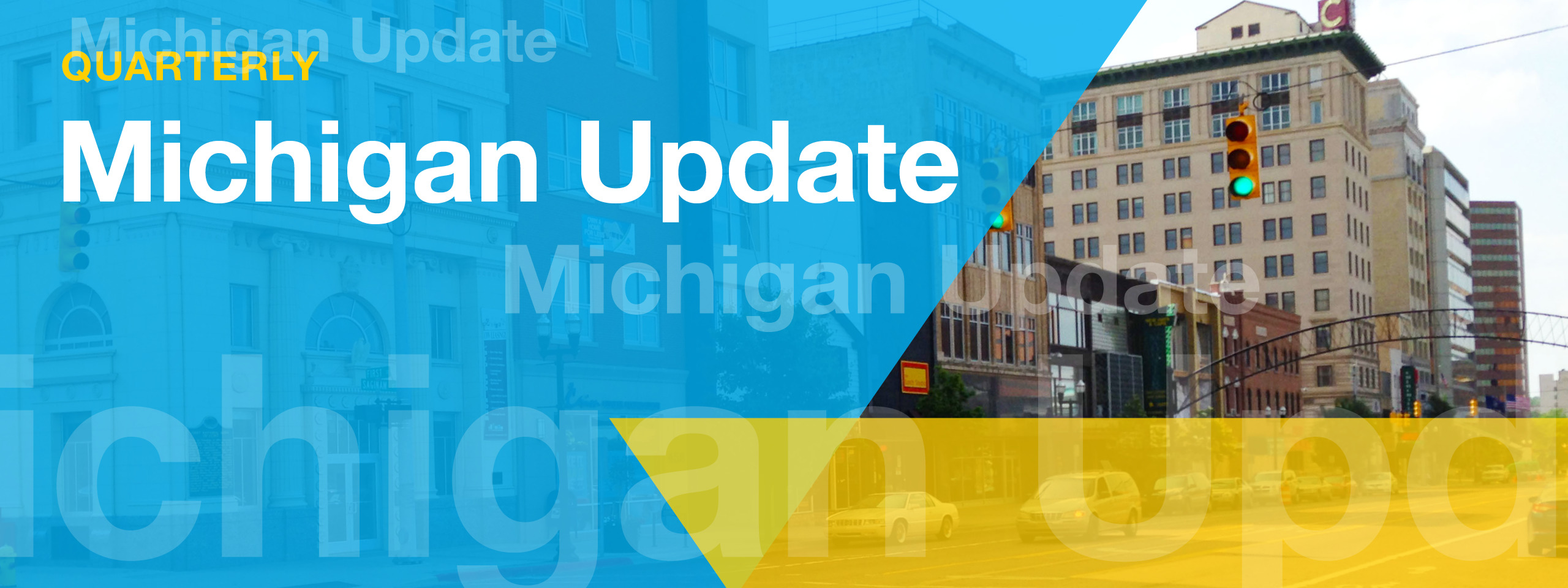Topic(s): ARPA, Community Revitalization, General Announcements, News
Michigan Initiatives Quarterly Update: April – June 2021
July 1, 2021

This quarterly update from Community Progress’ Michigan Initiatives team highlights important revitalization news and resources from across the state. For specific inquiries or to share how your community is addressing vacant, abandoned, and deteriorated properties in Michigan, email Payton Heins, Director of Michigan Initiatives at [email protected].
Communities set neighborhood improvement priorities for local and county American Rescue Plan (ARP) funding
U.S. Treasury released its final interim rule providing guidance to counties, cities, townships, villages, and tribal governments on eligible uses for State and Local Fiscal Recovery Fund allocations. A number of uses to help strengthen neighborhoods including home repair, affordable housing, and stormwater infrastructure are called out directly in the guidance. Communities are currently setting priorities for how they will use these funds to address the wide-ranging impacts of COVID-19 and support their long-term stability by preventing additional property deterioration and vacancy.
In Michigan
The City of Detroit conducted community meetings and an on-going survey to identify top community priorities for allocating local ARP funds. “Rebuild Our Neighborhoods” was the top response, which would include activities like grants for block clubs to improve vacant land, home repair grants to seniors, down payment assistance, and vacant property cleanouts.
The City of Flint held a community presentation on ARP funds and current priorities. Residents are invited to share their thoughts via an online poll, email, mail, phone, or dropping written comments at City Hall. The top five priorities identified by residents so far are blight elimination, owner-occupied home rehab and repairs, public safety, job creation, and infrastructure.
Across the U.S.
The City of Syracuse, New York plans to invest in efforts to improve property conditions and support neighborhood resiliency including a citywide housing study to inform ongoing strategy, rehab and repair of occupied and vacant homes, land bank-led stabilization and demolition of vacant properties in service of broader revitalization goals, low-interest home improvement loans, commercial property redevelopment, and workforce development opportunities in the construction fields.
The City of Toledo, Ohio plans to allocate roughly $60 million toward housing construction, demolition of vacant residential and commercial structures, blight reduction, home renovation, lead safety and historic home preservation and other revitalization efforts.
The Michigan Initiatives team provides technical assistance to Bay City and Lansing
Michigan Initiatives program staff worked with the City of Lansing and the City of Bay City over the past few months to assess current policies and practices to address problem properties in the cities’ neighborhoods and commercial corridors, interviewing local stakeholders and examining vacancy and market indicators. Staff offered recommendations to adopt, adapt, and prioritize policies and practices that would help advance each city’s response to problem properties and help mitigate a heightened risk of the neighborhood and commercial corridor de-stabilization due to COVID-19’s economic impacts. Technical assistance reports from these engagements can be found on our website: Bay City report and Lansing report.
 Michigan Revitalization in the News
Michigan Revitalization in the News
Biden’s Neighborhood Revitalization Plan Looks to Detroit for Inspiration
The Detroit Land Bank Authority’s Rehabbed and Ready Program is being held up as a model for the Biden Administration’s proposal to renovate 500,000 homes via the Neighborhood Homes Investment Act tax credit program.
Read more.
When problematic properties don’t sell, the Bay County Land Bank Authority steps in
The Bay County Land Bank partners with municipalities and small-scale developers to transform vacant, tax-foreclosed properties into new housing opportunities.
Read more.
‘Attainably priced’ modular home available in Ishpeming funded by MSHDA program
The Marquette County Land Bank Authority with funding support from the Michigan State Housing Development Authority (MSHDA) Modular Home Program is building new homes on land bank-owned lots to help increase the workforce housing supply in Marquette County.
Read more.
Dozens of groups hit the streets to beautify vacant lots in Flint neighborhoods
The Genesee County Land Bank Authority’s Clean and Green program kicks off the 2021 season with sixty-nine community groups, who will clean and green nearly 3,700 properties this summer. Beyond improving vacant lots, the program offers workforce development opportunities and has demonstrated success in lowering crime.
Read more.
Black Wall Street among owners of revitalized Washington Square properties
With the goal of a sustainable, vibrant, community-oriented commercial district, the Kalamazoo County Land Bank partnered with neighborhood groups to plan the future of Washington Square.
Read more.
Michigan Revitalization Resources
- Turning the Tide: Opportunities for the City of Bay City, Michigan to Improve Residential Property Conditions and Quality of Life. Download here.
- Building on Success: Opportunities to Enhance Home Preservation Efforts and Commercial Vacancy Strategies in Lansing, Michigan. Download here.
- “An Unprecedented Opportunity for COVID Relief and Equitable Neighborhood Transformation.” Read here.
- The Saving Power of Community Creativity: Highlights of Arts, Culture, and Creative Placemaking Responses to COVID-19. Download here.
- Revitalization in Michigan: A Guide to Transforming Vacant, Abandoned, and Deteriorated Properties through Code Enforcement. Download here.
- Good Deeds: Community-minded intervention to strengthen the Detroit housing market is working, according to U-M analysis. Download here.
Subscribe to join 14,000 community development leaders getting the latest resources from top experts on vacant property revitalization.
